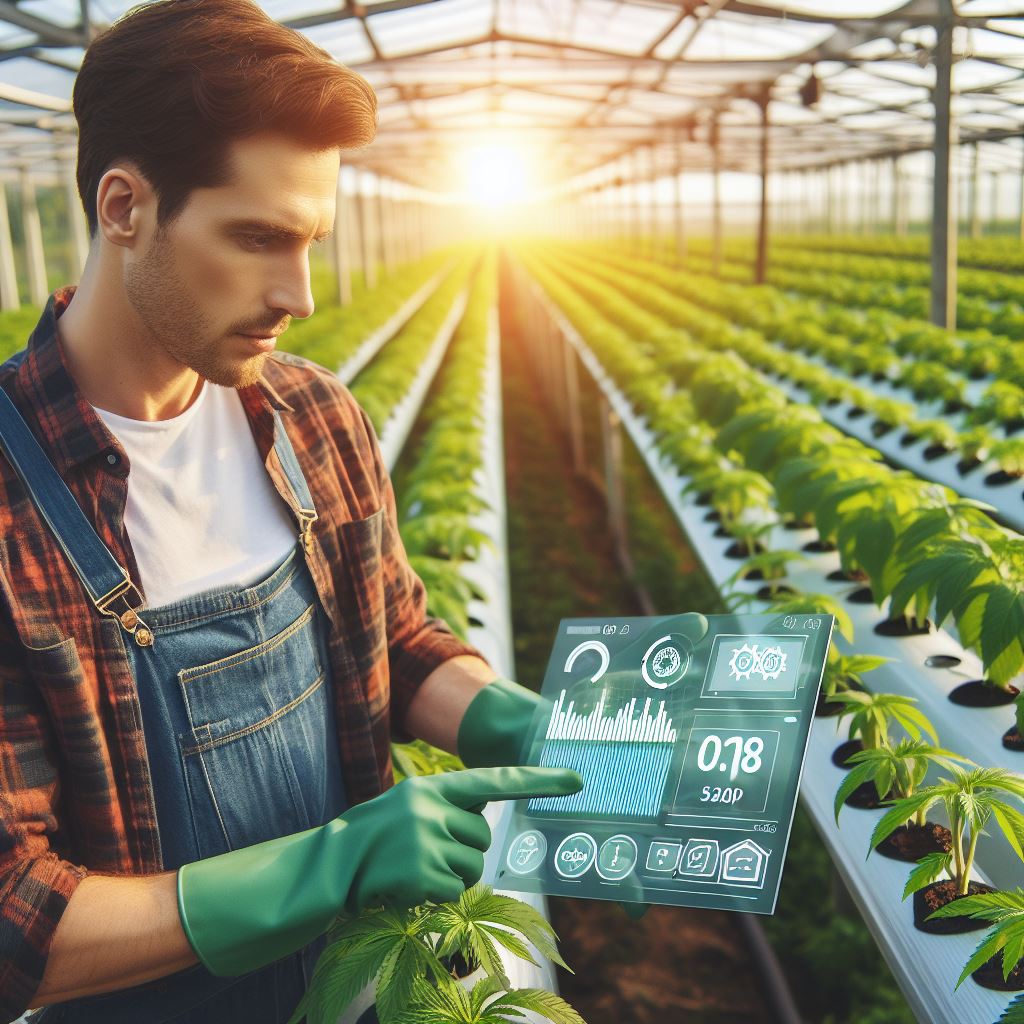Crop-Specific Tech: Precision Cultivation Tips
Last Updated on February 27, 2024
Introduction
Crop Specific Tech: Precision Cultivation is a fundamental aspect of modern crop farming requiring tips for successful practice.
It involves using advanced technologies and techniques to enhance crop yield while minimizing resource inputs such as water, fertilizers, and pesticides.
By adopting these methods, farmers can optimize production efficiency, reduce costs, and minimize environmental impacts.
Crop-specific technologies are designed to address the unique needs of different crops and provide customized solutions to maximize yields.
These technologies encompass a wide range of tools, including precision planting, crop monitoring systems, variable-rate application technologies, and automated harvesting equipment.
Precision planting is a technique that ensures accurate seed placement and optimal spacing, allowing for uniform crop establishment.
Crop monitoring systems utilize sensors and satellite imagery to track plant health, enabling farmers to detect early signs of pests, diseases, or nutrient deficiencies.
Variable-rate application technologies enable farmers to apply fertilizers and pesticides at precise rates based on crop needs, reducing waste and potential environmental pollution.
Automated harvesting equipment streamlines the harvesting process, improving efficiency and reducing post-harvest losses.
In short, precision cultivation and crop-specific technologies are indispensable tools for modern crop farming.
By adopting these practices, farmers can achieve higher crop yields, reduce resource waste, and minimize environmental impacts.
Embracing these innovations not only benefits farmers but also contributes to a sustainable and efficient agricultural sector.
Read: Innovative Drip Irrigation for Small Farms
Crop-specific technology for precision cultivation
Technology has revolutionized the field of agriculture, especially when it comes to precision cultivation.
Crop-specific technologies enable farmers to optimize their practices, resulting in higher yields and reduced resource wastage.
In this section, we will explore three key technologies that have transformed precision cultivation: drones, GPS and mapping systems, and variable rate technology.
Technology 1: Drones
Drones have become an essential tool for modern farmers.
Their ability to capture high-resolution images and collect valuable data makes them indispensable in crop farming.
Moreover, drones offer numerous benefits:
- Improved crop monitoring and surveillance capabilities.
- Efficient pest detection and management.
- Enhanced crop health assessment for targeted interventions.
In precision cultivation, drones find various applications, including:
- Aerial surveys for yield estimation and crop health analysis.
- Precise application of fertilizers, pesticides, and herbicides.
- Mapping and identification of irrigation needs.
However, to ensure the effective use of drones, farmers should follow these tips:
- Invest in quality drones with advanced imaging capabilities and long flight durations.
- Regularly calibrate the sensors and cameras to ensure accurate data collection.
- Train personnel to operate drones safely and interpret the collected data correctly.
Technology 2: GPS and mapping systems
GPS and mapping systems have significantly improved precision cultivation by providing accurate spatial data.
These technologies offer farmers the following benefits:
- Precision seeding and planting based on specific field conditions.
- Optimized navigation for efficient spraying, irrigation, and harvesting.
- Creation of detailed field maps for better crop management.
For harnessing the full potential of GPS and mapping systems, farmers should consider these tips:
- Choose GPS systems with high accuracy and compatibility with farm machinery.
- Regularly update and synchronize the mapping software to access the latest data.
- Train operators on proper usage of GPS and mapping systems to maximize benefits.
Technology 3: Variable rate technology
Variable rate technology (VRT) allows farmers to apply inputs, such as fertilizers and pesticides, at varying rates based on specific field conditions.
This technology offers several advantages:
- Optimized resource utilization, leading to cost savings and reduced environmental impact.
- Precise application tailored to the nutrient or crop requirements in different areas of the field.
- Improved overall crop uniformity and yield potential.
To successfully implement variable rate technology in precision cultivation, farmers should consider the following tips:
- Conduct soil testing and analysis to determine the variability within the field.
- Invest in equipment capable of variable rate application, such as variable rate sprayers or spreaders.
- Regularly calibrate and maintain VRT equipment to ensure accurate application.
In essence, crop-specific technologies such as drones, GPS and mapping systems, and variable rate technology have revolutionized precision cultivation.
By utilizing these technologies effectively, farmers can enhance crop monitoring, optimize resource management, and ultimately increase yields.
Embracing these advancements is crucial for staying at the forefront of modern agriculture and sustaining the future of crop farming.
Read: Eco-Friendly Crop Management
Crop-specific considerations for precision cultivation
Corn farming
Specific challenges in corn farming
- Pests and diseases
- Weed competition
- Uneven plant spacing
Crop-specific precision cultivation techniques for corn
- Variable rate technology for seed and fertilizer application
- Use of GPS guidance systems for precise planting and cultivation
- Implementing pest and disease monitoring and management strategies
Tips for maximizing precision cultivation in corn farming
- Regularly calibrate and maintain precision farming equipment
- Monitor soil moisture levels and implement irrigation as needed
- Integrate data analysis to make informed decisions for crop management
Wheat farming
Specific challenges in wheat farming
- Weed control
- Disease management
- Optimizing nutrient management
Crop-specific precision cultivation techniques for wheat
- Implementing precision planting to optimize seed placement
- Use of remote sensing and imaging technology for disease detection
- Adopting variable rate technology for fertilizer application
Tips for maximizing precision cultivation in wheat farming
- Regularly monitor and adjust planting depth for optimal emergence
- Implement crop rotation to minimize disease pressure
- Conduct soil testing to customize nutrient management plans
Soybean farming
Specific challenges in soybean farming
- Weed competition
- Optimizing planting density
- Pest control
Crop-specific precision cultivation techniques for soybeans
- Implementing precise row spacing and seed placement for optimal plant density
- Utilizing herbicides with different modes of action to manage weed resistance
- Deploying integrated pest management practices to control insects and diseases
Tips for maximizing precision cultivation in soybean farming
- Regular scouting and monitoring for early pest detection
- Adjusting planting dates based on soil temperature and moisture conditions
- Utilizing technology to track plant growth and make timely input decisions
By taking into account the specific challenges and adopting precision cultivation techniques, farmers can enhance the efficiency and productivity of their corn, wheat, and soybean farming practices.
Read: Water-Saving Tips for Sustainable Farming

Future trends and innovations in crop-specific technology
Emerging technologies for precision cultivation
- Remote sensing technologies such as drones and satellites are being used to monitor crop health.
- Artificial intelligence and machine learning algorithms are being employed to optimize fertilization and pest control.
- Robotic systems are being developed to automate various farming tasks, including planting and harvesting.
- Sensor technologies are being utilized to collect data on soil moisture, temperature, and nutrient levels in real-time.
- Genetic engineering techniques are being explored to develop crops with enhanced resistance to diseases and environmental stressors.
Potential benefits of future innovations in crop-specific technology
- Increased crop yields: Precision cultivation technologies can help optimize resource allocation, leading to higher productivity.
- Enhanced resource efficiency: By using sensors and data-driven insights, farmers can reduce water and fertilizer usage.
- Improved pest and disease management: AI-powered systems can detect and respond to potential threats in a timely manner.
- Lower environmental impact: Precision cultivation can minimize the use of pesticides and other harmful chemicals.
- Better crop quality: Genetic engineering can improve traits such as taste, nutritional content, and shelf life.
Practical implications of adopting new technologies
- Initial investment: Acquiring and implementing crop-specific technologies may require a significant upfront cost.
- Training and education: Farmers need to familiarize themselves with the operation and maintenance of new technologies.
- Data management: Efficient data collection, storage, and analysis systems are essential for making informed decisions.
- Technical support: Access to reliable technical support is crucial in case of equipment malfunctions or software issues.
- Regulatory considerations: New technologies may be subject to regulations and compliance requirements that need to be met.
In summary, the future of crop-specific technology holds great promise for enhancing precision cultivation practices.
Emerging technologies such as remote sensing, AI, robotics, sensors, and genetic engineering offer numerous benefits for farmers.
However, the adoption of these technologies may require careful consideration of the potential costs, training needs, data management, technical support, and compliance with regulations.
As advancements continue, it is important for farmers and agricultural stakeholders to stay informed and adapt to these innovations to maximize the potential of crop-specific technology.
Read: Heat-Tolerant Crops: Future of Farming
Conclusion
Crop-specific technology plays a crucial role in precision cultivation.
By utilizing advanced tools and techniques, farmers can optimize their crop production and improve overall yields.
It is essential for farmers to embrace and implement crop-specific technologies on their farms.
These technologies offer numerous benefits, such as increased efficiency, reduced resource wastage, and improved crop quality.
Looking ahead, precision cultivation and crop-specific tech hold great promise for the future of agriculture.
As the demand for high-quality, sustainably produced food grows, these technologies will become even more critical in meeting these challenges.
To stay competitive and achieve better results, farmers must proactively adopt crop-specific technologies.
By investing in these tools and practices, they can enhance their farming operations, maximize productivity, and minimize environmental impact.
In closing, precision cultivation, and crop-specific tech are the way forward for modern farming.
To thrive in this ever-evolving industry, farmers must embrace these advancements and harness their potential for sustainable and efficient agricultural practices.


